High performance and the fast recovery of muscle tissue are essential for athletes – and here is where tropical fruits are an overlooked group of foods with sheer superpowers! In fact, fruit detox diets and fasts are used for full-body regeneration and rejuvenation. This knowledge can be integrated into sports recovery – and is actually used for those exact purposes by professional athletes. It is somehow a secret tool in athletes’ health.
Tropical fruits are gaining more attention in sports nutrition
While the rejuvenating and health-boosting effects of fruit are traditionally known in tropical countries and ethnobotany, they have recently gained more attention in the scientific community – also in health and sports nutrition.
“Overall, tropical fruits can aid sports performance by improving physical strength, increasing the recovery in injury, attenuate muscle soreness, and reducing fatigue.”
Chabib et al., 2020
The benefits seem to be of such a magnitude that the researchers are suggesting the development of nano-supplements based on the compounds found in tropical fruit (Chabib et al., 2020), but luckily we can also go the natural route and simply make tropical fruits a much bigger part of our diet! For example, foods rich in complex carbs, like starches and grains, can be replaced with bananas and other tropical fruits rich in simple sugars like:
Benefits of Tropical Fruits for Athletes
Nutrients, antioxidants, energy, and hydration of tropical fruits are critical factors discussed here. However, this does not even scratch the surface of the myriad of functional and regenerative health benefits that come along with consuming tropical fruits, and the list is almost indefinite!
For example, tropical fruits contain enzymes that reduce inflammation and muscle regeneration, like bromelain in pineapples and papain in papayas. The full chemical composition and effect on human health of tropical fruits, however, is still widely unknown, as these are complex, organic plant-produced parts: nature is still a mystery in its entirety, which makes it irreplaceable also in health, and humans will probably never be able to improve the beauty or effectiveness of naturally grown foods – especially species-specific foods like edible tropical fruits.
So let’s dive into the three main types of benefits:
1. Nutrients and chemical composition
Consuming tropical fruits has significant health benefits, including a higher overall vitamin and mineral intake, as they are more nutritious than their counterparts grown in colder climates (read more here)! Potentially, tropical fruits contain all macro- and micronutrients that the body needs from external sources (read) to function and regenerate effectively. This includes energetic nutrients (carbs, fatty acids), omega-3, but also protein,, water-soluble vitamins, iron, and lesser-known micronutrients like silica, boron, sulfur (i.e., durian fruit), chromium, and selenium:
“Many fruits and unconventional foods are available in the tropics and represent valuable minerals sources. Green leaves appear as outstanding mineral sources, especially in calcium and iron, followed by nuts. “
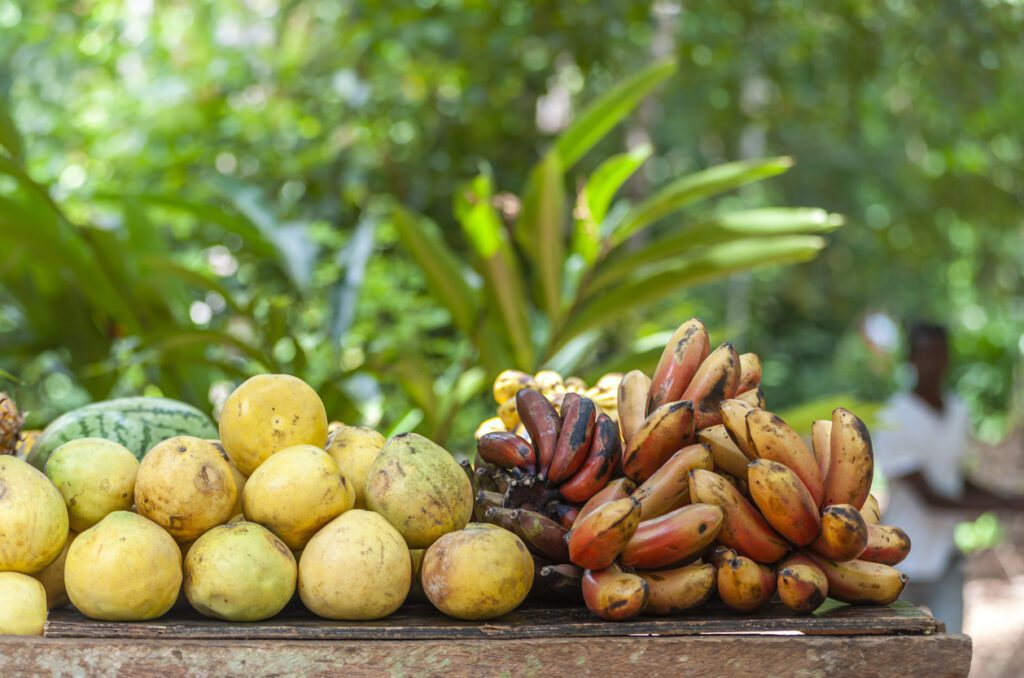
Different fruits contain them in different proportions and quantities, depending on the composition and if it is a fatty, watery, sweet, acidic, or vegetable fruit (see categories here). For instance, bananas are a good supply of potassium and magnesium, which aid muscular function and prevent cramping. Most tropical fruits have high quantities of vitamin C, especially acidic ones, which can boost the immune system and improve recovery after exercise. Orange-colored fruits, like mangoes and papaya, contain beta-carotene (precursor of vitamin A), which gives those fruits their color. Beta-carotene is essential for immune system function and, thus, regenerative processes.
In addition to the vital vitamins and minerals, tropical fruits contain antioxidants in abundance. Antioxidants are compounds that help protect the body from damage caused by free radicals, which are molecules that are unstable and can harm cells and contribute to the development of chronic diseases. Generally, tropical fruits contain higher levels of antioxidants than temperate fruits:
“These remarkably higher antioxidant activities found for some tropical fruits is related to the presence of exceptionally high levels of compounds known for their elevated antioxidant activity.”
Pereira-Netto, 2018
2. Hydration
Hydration is a key factor in sports performance. The high water content in tropical fruits is the best way to provide and replace the fluids needed to keep up hydration during physical activity.
Why is eating fruits from tropical climates the best way for humans to do so? One answer lies in our evolutionary past: humans come from a tropical highly frugivorous ancestry and therefore fruits are our species’ original food source!

Tropical Fruits do not only contain a significant amount of purified water, but their juice is a complex solution of nutrients and minerals. It is not entirely understood how osmotic effects play a role in water uptake into cells, but the chemical composition of a watery solution does impact how well we can absorb a fluid. We might see the water from fruit as the original – and extremely superior – version of artificial sports beverages marketed to athletes for hydration: most of those waters are enriched with sugars, minerals (salts), and acidic compounds and flavors that basically mimic natural fruits’ water.
Watermelon is the go-to example of a fruit optimal for hydration: it contains more than 90 percent water. Coconut water has also gained in popularity among highly active people. But, besides the direct hydration through fruity beverages, a diet high in fruits can aid hydration of the body before, after and between workouts.
3. Energy
The body needs energy for everything: for power, performance, regeneration, and basically its whole metabolism – for life. For this reason, boosting mitochondrial health has gained much attention lately, also in sports performance.
Tropical fruits are an effective energy source for athletes because of their high content of readily-available, simple sugars. These sugars – glucose and fructose – are easy to digest while still being within their natural matrix and fiber-rich fruit flesh. Read more here on why naturally occurring sugars in fruits are healthy!
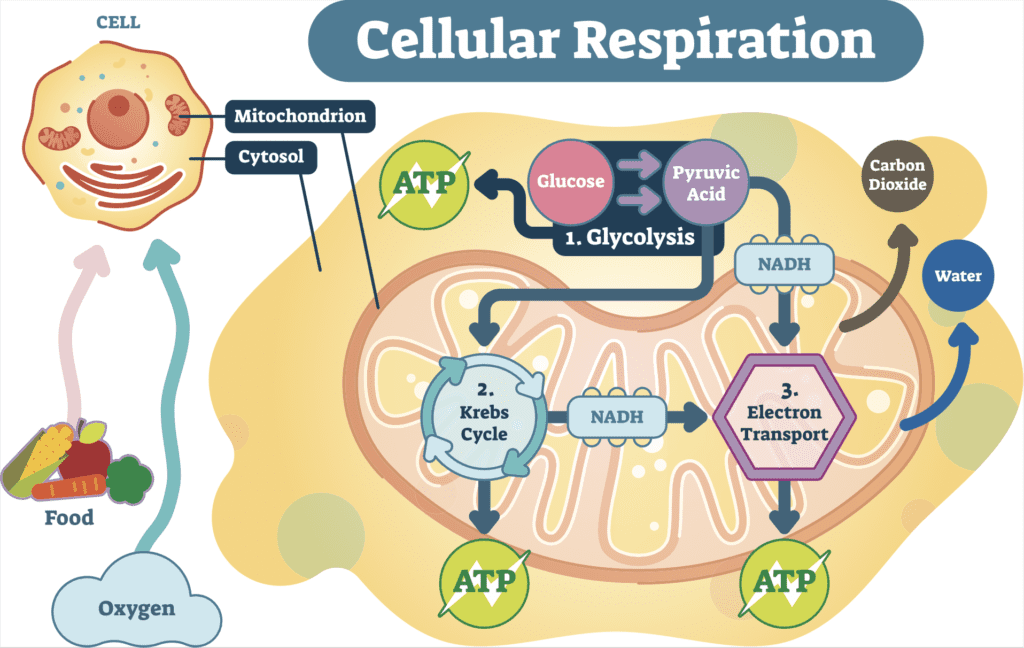
Figure: Simple sugars from tropical fruits are readily available for energy production (ATP) in the cell – needed for performance and regeneration!
Bananas, for example, are known to be a good source of carbs and energy before exercising – like all sweet fruits. However, the energy needed for performance is also essential in recovery after sports:
The energy provided by high-carb fruits – in this case, bananas – has shown to be a key for recovery after heavy training: “The primary nutrition-based strategy to attenuate exercise-induced metabolic perturbation and inflammation is acute carbohydrate ingestion of either sugar beverages or banana fruit” is the conclusion of a randomized cross-over trial done by Nieman et al. (2018). It is important to note at this point, that the current “war on sugar” should be stopped immediately, as simple carbs from natural foods (fruits and vegetables) are not only not harmful, but imperative for good health! Read more on this topic here.
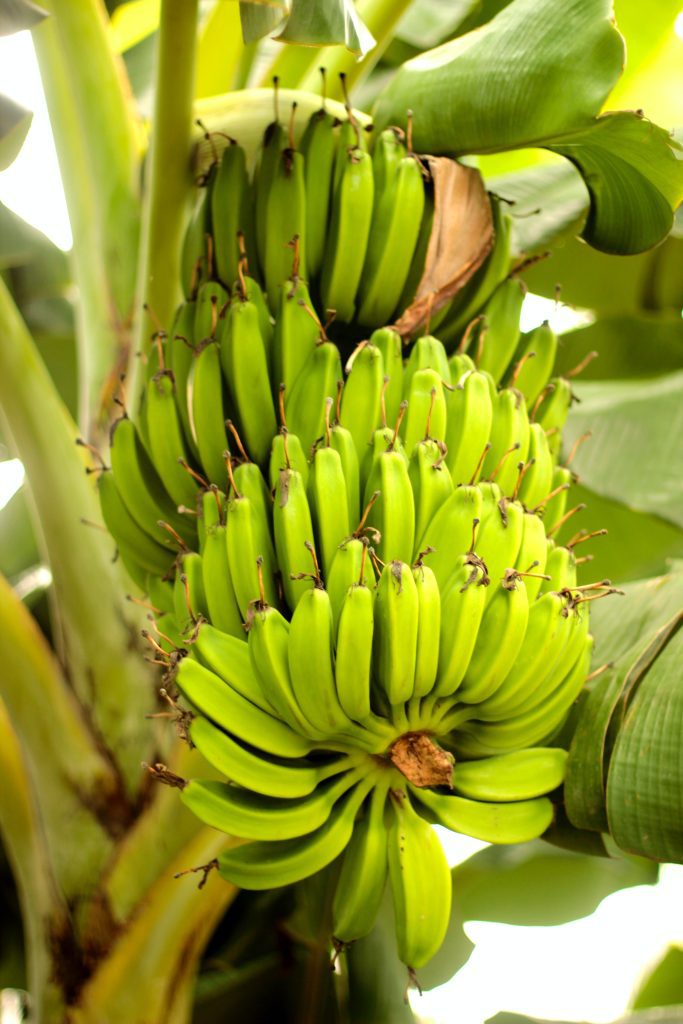
Practical tips for incorporating tropical fruits into the diet
If you are coming from a “standard” athlete diet, you should slowly raise the amount of fruit – tropical fruits in particular – in your diet. There are many reported benefits of striving towards a high-raw, high-fruit diet in the long run. However, those changes are intense and will induce a natural cleansing process of the body – an effect that is definitely beneficial but can be tasking as an athlete and for performance initially. Therefore going slowly in the right direction will benefit you without experiencing a major “cleansing crisis”.
How you can get more flavorful and healthy fruits into the diet of an athlete:
Smoothies
Athletes would benefit greatly from consuming smoothies with tropical fruits after sports and for general recovery. Smoothies are great as they allow you to integrate a bigger amount of fruits easier into the diet. If you want to make a refreshing and hydrating smoothie, try blending papaya, mango, and pineapple. Banana-based smoothies are always a great way to add calories with fruits. Smoothies also allow for integrating powders – like green gras juice powder – into the diet in a pleasant way.
Juices
Watery juices can be used during workouts and juices with added green are perfect after workouts for refilling energy and minerals the natural way.
Salads
Salads can be greatly enhanced in their flavor and nutrient content by adding tropical fruits like mango, dragon fruit or avocados. The sweet and fatty fruits can also be mixed with citruses and create a healthy, natural dressing with a satisfying flavor.
Desserts
Tropical fruits are a dessert itself and it is often only a matter of changing habits to replace sweets with ripe, tasty fruits. For a sweet treat that is both satiating and good for you, give “nice cream” a try: frozen bananas mixed with coconut milk fruit-nut-maple syrup topping.
Açai bowls
Açai-banana bowls are known to be able to replace a full meal in Brazilian culture and are traditionally consumed to get more energy and “vitaminas” for sports and to hit the gym. The berry is a bit higher in fat and, together with bananas and a fruit-nut topping, is highly energetic and nutritious. Therefore, replacing one meal with a bowl is a great add and helps us going in the right direction toward a healthy athlete’s diet.
Check out more about the benefits of tropical fruits for humans here.
Check out our (independent) supplement guide for health and regeneration here.
To know more about how to do a high-fruit diet check out our free guide:
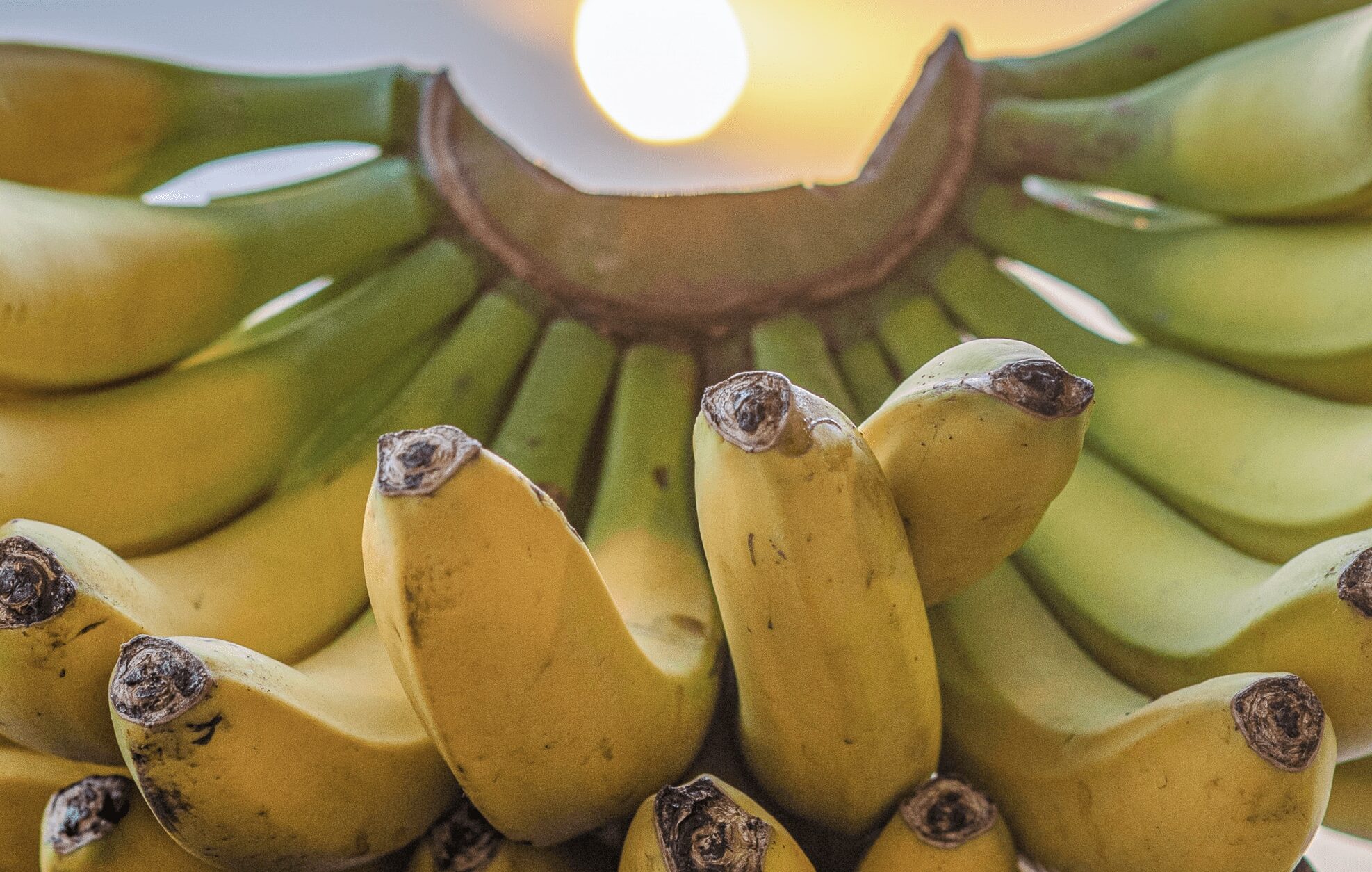
Go to How to do the Frugivore Diet
References
- L. Chabib, A. M. Trianloka, A. U. Hidayat, R. Awaluddin, F. Firmansyah, Potential tropical fruits to aid sports performance and its prospect to be developed into Nano Supplement. IOP Conference Series: Earth and Environmental Science. 448, 012019 (2020).
- Cannon, R.J. and Ho, C.-T. (2018) “Volatile sulfur compounds in tropical fruits,” Journal of Food and Drug Analysis, 26(2), pp. 445–468. Available at: https://doi.org/10.1016/j.jfda.2018.01.014.
- Leterme, P. et al. (2006) “Mineral content of tropical fruits and unconventional foods of the Andes and the Rain Forest of Colombia,” Food Chemistry, 95(4), pp. 644–652. Available at: https://doi.org/10.1016/j.foodchem.2005.02.003.
- A. B. Pereira-Netto, Tropical fruits as natural, exceptionally rich, sources of bioactive compounds. International Journal of Fruit Science. 18, 231–242 (2018), doi:10.1080/15538362.2018.1444532.
- Bromelain (no date) National Center for Complementary and Integrative Health. U.S. Department of Health and Human Services. Available at: https://www.nccih.nih.gov/health/bromelain (Accessed: April 3, 2023).
- Kang, Y.-M. et al. (2021) “Papain ameliorates lipid accumulation and inflammation in high-fat diet-induced obesity mice and 3T3-L1 adipocytes via AMPK activation,” International Journal of Molecular Sciences, 22(18), p. 9885. Available at: https://doi.org/10.3390/ijms22189885.
- Nieman, D.C. et al. (2018) “Metabolic recovery from heavy exertion following banana compared to sugar beverage or water only ingestion: A randomized, crossover trial,” PLOS ONE, 13(3). Available at: https://doi.org/10.1371/journal.pone.0194843.


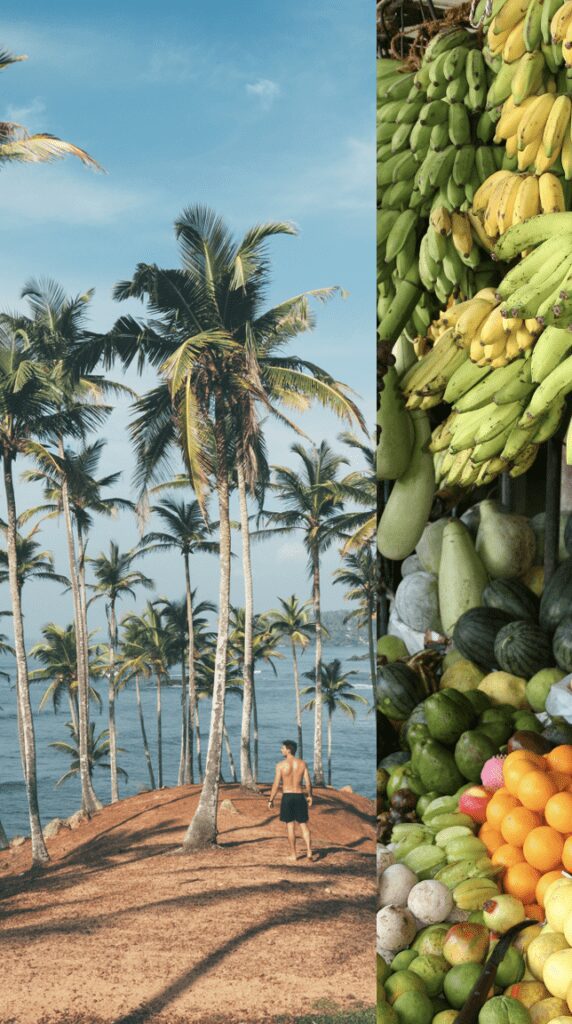
Add Comment